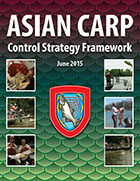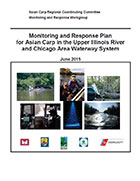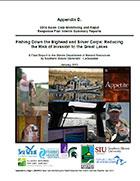Asian Carp Regional Coordinating Committee Releases 2015 Asian Carp Control Strategy Framework
FOR IMMEDIATE RELEASE
June 30, 2015
Contacts:
U.S. Fish and Wildlife Service, Katie Steiger-Meister, 612-713-5317
U.S. Environmental Protection Agency, Laura Allen, 202-564-1175
U.S. Army Corps of Engineers, Lynne Whelan, 312-846-5330
U.S. Geological Survey, Sandy Morrison, 734-214-9393
Illinois Department of Natural Resources, Chris Young, 217-557-1240
The Asian Carp Regional Coordinating Committee today announced the release of the 2015 Asian Carp Control Strategy Framework. The Framework outlines the steps federal, state, and provincial partners will take in the fight again Asian carp.
The ACRCC’s 2015 Asian Carp Control Strategy Framework outlines new risks to the Great Lakes from black carp and grass carp. It also highlights $74 million in projects, $16 million of which will be funded through the Great Lakes Restoration Initiative, to safeguard the Great Lakes from invasive Asian carp. Since the group’s inception in 2009, more than $318 million has been spent in research, control and monitoring efforts.
“We’re moving the fight against Asian carp from our back yard down the alley,” said Cameron Davis, co-chair of the ACRCC and Senior Advisor to the Administrator at the U.S. Environmental Protection Agency. “To protect the lakes, this Framework shores up our defenses near the Great Lakes and focuses our efforts further downstream toward the Mississippi River.”
“The Framework underscores that by working together we can and will move the needle on Asian control and management,” said U.S. Fish and Wildlife Service Midwest Deputy Regional Director Charlie Wooley. “At the request of our state partners we will continue to provide our technical assistance in Great Lakes monitoring efforts.”
Key initiatives in the 2015 Framework include advancing a U.S. Army Corps of Engineers study on new controls at Brandon Road Lock and Dam, refining detection and control technologies, and continuing efforts to suppress fish populations through netting. A full list of 2015 action items, project descriptions and intended outcomes is provided in Appendix 2 of the Framework.
"Operating the electric barrier system, undertaking Asian carp monitoring and beginning the Brandon Road phase of the Great Lakes and Mississippi River Interbasin Study are key components in the Corps' efforts to keep Asian carp from establishing in the Great Lakes. The Army Corps of Engineers will be working diligently with our partners in the ACRCC to move these projects forward in the coming year," said Col. Christopher Drew, Commander of the U.S. Army Corps of Engineers Chicago District.
U.S. Geological Survey scientists are in the lab and field testing and refining Asian carp control tools and technologies developed over the last few years," said Leon Carl, USGS Midwest Regional Director. "We are committed to providing these resources to our partners to inform Asian carp management decisions."
Concurrent to the 2015 Framework, the ACRCC is releasing the annual Monitoring and Response Plan for Asian carp in the Upper Illinois River and Chicago Area Waterway System. Actions for the 2015 field season are similar to prior years. The focus continues to be on monitoring and removal of bighead and silver carp downstream of the Electric Barrier System in the Chicago Area Waterway System and the upper Illinois Waterway, as well as ongoing evaluations of the effectiveness of barriers and gears used to keep Asian carp from establishing in the CAWS and Lake Michigan. Additionally, agency crews will conduct heightened evaluations surrounding Brandon Road Lock and Dam as a potential future control point, consistent with U.S. Army Corps of Engineers Great Lakes and Mississippi River Interbasin Study findings. Summary of 2014 findings are posted alongside the 2015 Monitoring and Response Plan.
For more information on the ACRCC and to read the 2015 Asian Carp Control Strategy Framework or 2015 Monitoring and Response Plan, please visit: www.asiancarp.us.





